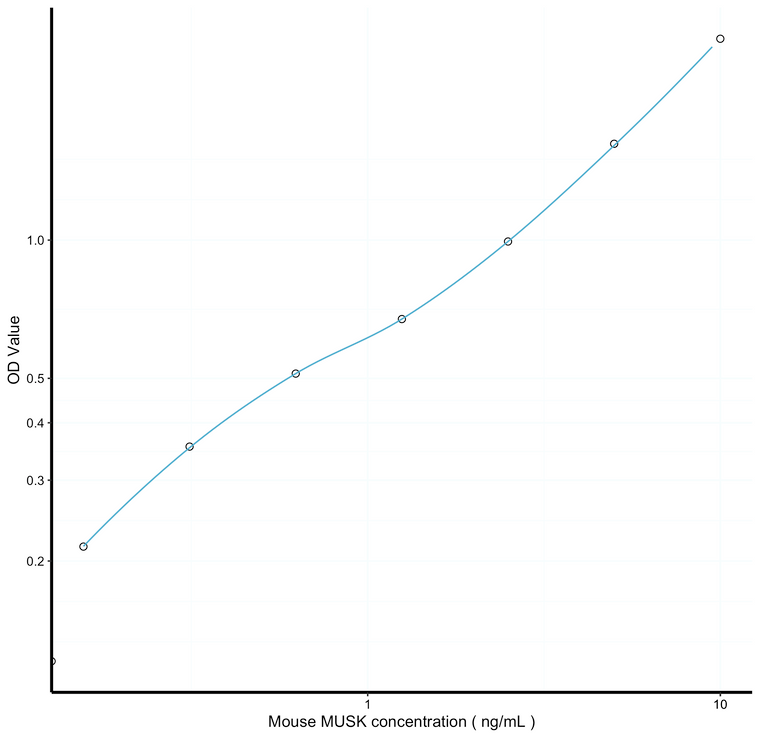| Applications: |
ELISA |
| Reactivity: |
Mouse |
| Note: |
STRICTLY FOR FURTHER SCIENTIFIC RESEARCH USE ONLY (RUO). MUST NOT TO BE USED IN DIAGNOSTIC OR THERAPEUTIC APPLICATIONS. |
| Sensitivity: |
0.061ng/mL |
| Detection Limit: |
0.156-10ng/mL |
| Short Description: |
This MUSK Sandwich ELISA Kit, Ready-To-Use is an in-vitro enzyme-linked immunosorbent assay for the measurement of samples in mouse cell culture supernatant, serum and plasma (EDTA, citrate, heparin). |
| Storage Instruction: |
The whole kit may be stored at-20°C for up to 12 months from receipt. An unopened kit may be stored in the fridge at 2-8°C for up to 6 months. Once opened store individual kit contents according to components table provided with the kit. |
| Assay Time: |
3 hrs |
| Gene Symbol: |
Musk |
| Gene ID: |
18198 |
| Uniprot ID: |
MUSK_MOUSE |
| Immunogen Region: |
Ready-To-Use |
| Sample Type: |
tissue homogenates or other biological fluids. |
| Tissue Specificity | Expressed preferentially in skeletal muscle. |
| Post Translational Modifications | Ubiquitinated by PDZRN3. Ubiquitination promotes endocytosis and lysosomal degradation. Phosphorylated. Phosphorylation is induced by AGRIN. Autophosphorylated. Autophosphorylation at Tyr-553 is required for interaction with DOK7 which in turn stimulates the phosphorylation and the activation of MUSK. Neddylated. |
| Function | Receptor tyrosine kinase which plays a central role in the formation and the maintenance of the neuromuscular junction (NMJ), the synapse between the motor neuron and the skeletal muscle. Recruitment of AGRIN by LRP4 to the MUSK signaling complex induces phosphorylation and activation of MUSK, the kinase of the complex. The activation of MUSK in myotubes regulates the formation of NMJs through the regulation of different processes including the specific expression of genes in subsynaptic nuclei, the reorganization of the actin cytoskeleton and the clustering of the acetylcholine receptors (AChR) in the postsynaptic membrane. May regulate AChR phosphorylation and clustering through activation of ABL1 and Src family kinases which in turn regulate MUSK. DVL1 and PAK1 that form a ternary complex with MUSK are also important for MUSK-dependent regulation of AChR clustering. May positively regulate Rho family GTPases through FNTA. Mediates the phosphorylation of FNTA which promotes prenylation, recruitment to membranes and activation of RAC1 a regulator of the actin cytoskeleton and of gene expression. Other effectors of the MUSK signaling include DNAJA3 which functions downstream of MUSK. May also play a role within the central nervous system by mediating cholinergic responses, synaptic plasticity and memory formation. |
| Protein Name | Muscle - Skeletal Receptor Tyrosine-Protein KinaseMuscle-Specific Tyrosine-Protein Kinase ReceptorMuskMuscle-Specific Kinase Receptor |
| Database Links | |
| Cellular Localisation | Postsynaptic Cell MembraneSingle-Pass Type I Membrane ProteinLocalizes To The Postsynaptic Cell Membrane Of The Neuromuscular Junction |
| Alternative ELISA Names | Muscle - Skeletal Receptor Tyrosine-Protein Kinase ELISA kitMuscle-Specific Tyrosine-Protein Kinase Receptor ELISA kitMusk ELISA kitMuscle-Specific Kinase Receptor ELISA kitMusk ELISA kitNsk2 ELISA kit |
| output | |
Information sourced from Uniprot.org
12 months for antibodies. 6 months for ELISA Kits. Please see website T&Cs for further guidance







